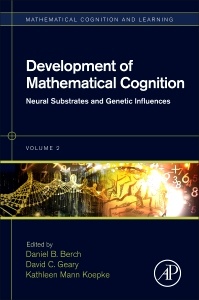Description
Development of Mathematical Cognition
Neural Substrates and Genetic Influences
Mathematical Cognition and Learning (Print) Series
Coordinators: Berch Daniel B., Geary David C., Mann Koepke Kathleen
Language: English
Subject for Development of Mathematical Cognition:
Support: Print on demand
Description
/li>Contents
/li>Biography
/li>Comment
/li>
Development of Mathematical Cognition: Neural Substrates and Genetic Influences reviews advances in extant imaging modalities and the application of brain stimulation techniques for improving mathematical learning. It goes on to explore the role genetics and environmental influences have in the development of math abilities and disabilities.
Focusing on the neural substrates and genetic factors associated with both the typical and atypical development of mathematical thinking and learning, this second volume in the Mathematical Cognition and Learning series integrates the latest in innovative measures and methodological advances from the top researchers in the field.
1. Introduction: How the Study of Neurobiological and Genetic Factors can Enhance our Understanding of Mathematical Cognitive Development
Part I: Neural Substrates 2. Number Symbols in the Brain 3. Neural and Behavioral Signatures of Core Numerical Abilities and Early Symbolic Number Development 4. A Neurodevelopmental Perspective on the Role of Memory Systems in Children’s Math Learning 5. Finger Representation and Finger-Based Strategies in the Acquisition of Number Meaning and Arithmetic 6. Neurocognitive Architectures and the Nonsymbolic Foundations of Fractions Understanding 7. Developmental Dyscalculia and the Brain 8. Neurocognitive Components of Mathematical Skills and Dyscalculia 9. Individual Differences in Arithmetic Fact Retrieval 10. Transcranial Electrical Stimulation and the Enhancement of Numerical Cognition
Part II: Genetic Influences 11. Individual Differences in Mathematics Ability: A Behavioral Genetic Approach 12. Genetic Syndromes as Model Pathways to Mathematical Learning Difficulties
Daniel B. Berch is Professor of Educational Psychology and Applied Developmental Science at the University of Virginia’s Curry School of Education. Prior to this position, he was Associate Dean for Research and Faculty Development at the Curry School. Before coming to the University of Virginia, Professor Berch served as Associate Chief of the Child Development and Behavior Branch at the National Institute of Child Health and Human Development, NIH. His previous federal service included a year spent as a Senior Research Associate at the U. S. Department of Education, advising the Assistant Secretary for Educational Research and Improvement. Professor Berch is a cognitive developmental psychologist with interests ranging from the development of numerical cognition and mathematical learning disabilities (MLD) to evolutionary perspectives on education. He has published articles on children’s magnitude representations, the development of number sense, and the role of working memory in MLD. He is senior editor of the book, Why is math so hard for some children? The nature and origins of mathematical learning difficulties and disabilities (co-edited by Michele Mazzocco).
Among other honors, he received the NIH Award of Merit, was elected Fellow of the American Psychological Association’s Division of Experimental Psychology, served as an ex officio member of the U.S. Department of Education’s National Mathematics Advisory Panel commissioned by President George W. Bush, was elected to the Evolution Institute’s Scientific Advisory Board (and chair’s its Education Subcommittee), was appointed to the AIM Academy’s Research Advisory Board, and served as a member of the Professional Advisory Board of the National Center for Learning Disabilities for six years. During the past several years, Professor Berch has been working on the implications of evolutionary theory for educational research and practice, publishing a book chapter on instructing evolved minds, serving a
- Provides details about new progress made in the study of neural correlates of numerical and arithmetic cognition
- Addresses recent work in quantitative and molecular genetics
- Works to improve instruction in numerical, arithmetical, and algebraic thinking and learning
- Informs policy to help increase the level of mathematical proficiency among the general public




